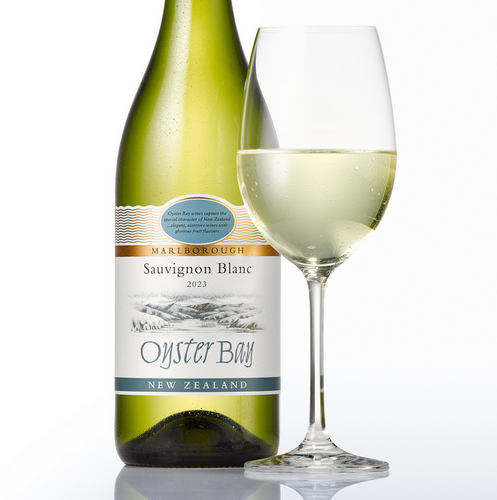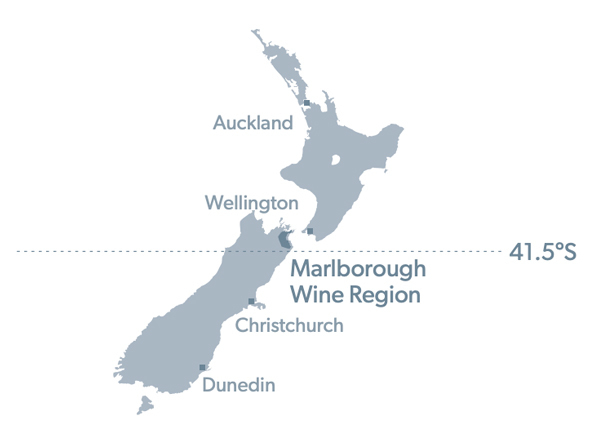
2023 Sauvignon Blanc
Oyster Bay
Marlborough Sauvignon Blanc
Stunningly aromatic tropical fruits and bright citrus notes, with a refreshingly zesty finish.
The philosophy of Oyster Bay is to produce fine, distinctively regional wines that are elegant and assertive with glorious fruit flavours. It all starts in the vineyard. We treat each vineyard block and parcel of wine individually. The fruit is harvested at optimum maturity, crushed, gently pressed and the juice is clarified.
A long, slow, temperature controlled fermentation and immediate bottling after winemaking retains all the wonderful fruit flavours and aromas present. Pale straw green in colour with brilliant clarity. A concentration of assertive passionfruit and tropical fruit flavours with an abundant bouquet, Oyster Bay Sauvignon Blanc is a wine that is always crisp, elegant and refreshing.
New Zealand is blessed with two natural attributes that enable it to produce Super Premium wines unlike anywhere else: a maritime cool climate and alluvial soils.
New Zealand’s position in the Pacific Ocean provides a unique, temperate maritime climate. The benefit of a cool climate with long sunshine hours is an extended growing season with a long, slow period of ripening. This allows the well ripened grapes to develop strong, intense varietal characteristics whilst maintaining a balanced, crisp, natural acidity. Over thousands of years the continual process of mountain building and erosion by glaciers, floods and wind, has deposited alluvial soils on the riverbeds and terraces throughout much of New Zealand. These are the soils in which the vines of New Zealand’s renowned wine regions grow unique, quality grapes.
Marlborough Growing Region
The Marlborough region located at the top of New Zealand’s South Island provides a dry, sunny, but temperate climate, which allows the grapes a long, slow period of ripening spanning from January to April. The clear, cold nights keep acid levels high in the grapes, even when their sugars are rising. These day/night temperature variations are a crucial climatic influence that retains the grapes’ crisp, fresh, vibrant fruit characters.
Soil Type
Prime central Wairau, Renwick and Brancott soils. Shallow, sandy loams over deep layers of free draining river gravels, providing low to moderate fertility and excellent drainage.
Clonal / Rootstock Selection
An emphasis on Bordeaux and UCD1 clones for pure instantly recognisable varietal intensity and flavour. Medium-to-low vigour rootstock selection matched for suitability to clone and soil vigour.
Winemaking Techniques
Throughout harvest, fruit was selected from progressively later ripening vineyard blocks, commencing with the coastal vineyards. Upon receipt to the winery, the grapes were destemmed and transferred to the tank presses where the free-run juice was separated and the remaining fruit lightly pressed. The juice was clarified and then inoculated with a select range of yeasts for added complexity and aromaticity during fermentation in stainless steel tanks. A slow, temperature controlled fermentation at 12–14°C (54–59°F) was undertaken. After a short period of yeast lees contact, the wine was racked for final blending and bottled young to ensure that the fresh, crisp and elegant varietal characters were retained.
Sustainable Winegrowing
As a founding member of Sustainable Winegrowing New Zealand, we are conscious of our environment and we work hard to identify sensitive areas such as wetlands, streams and native vegetation to ensure that our vineyard practices do not affect the plants and animals that inhabit these areas. We minimise our water usage through our state-of-the-art soil moisture probe technology. We look after our soils by having interrow ground cover plantings, and by spreading our mulch underneath our vines, to provide a botanically diverse ground which encourages beneficial insects into our vineyards.

2023 Marlborough Growing Season:
Excellent fruit from another exceptional vintage, delivering some of the most intensive flavours of recent years.
| Vineyard Locations: | Wairau Valley and Awatere Valley |
| Vine age: | 3 - 25 years |
| Harvest Date: | 21 March – 134 April 2023 |
Maturity Analysis at Harvest (weighted average)
| Brix: | 20.1 |
| Titratable Acidity: | 12.0g/L |
| pH: | 3.10 |
Wine Analysis
| Alcohol: | 12.0% v/v |
| Residual Sugar: | 4g/L |
| Titratable Acidity: | 7g/L |
| pH: | 3.4 |

